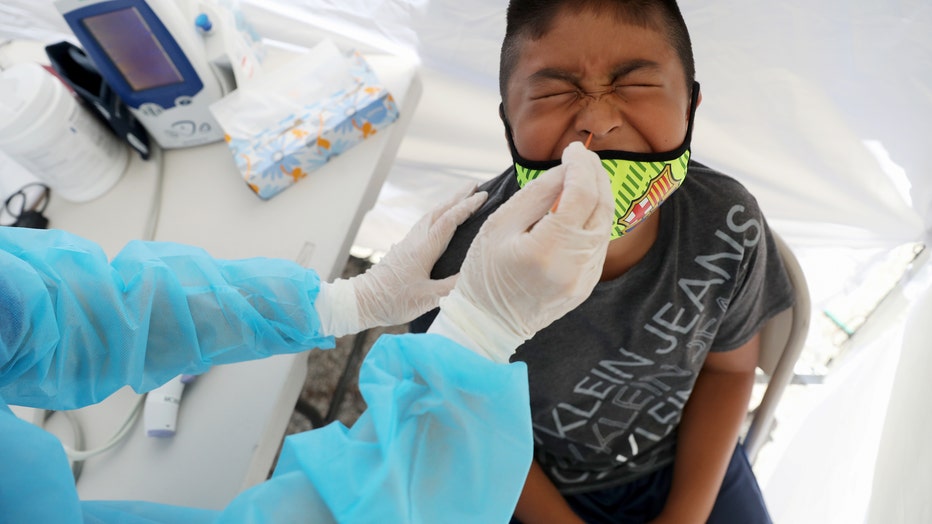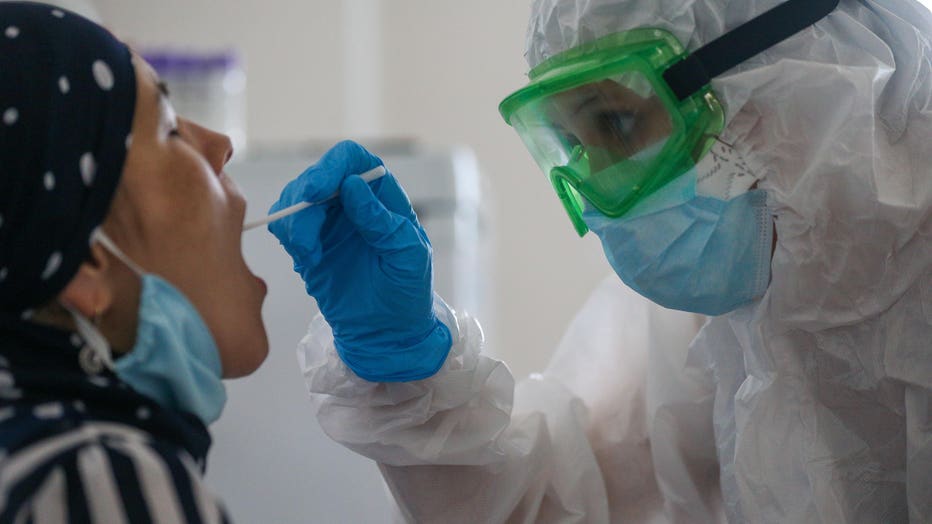Asymptomatic kids may be more contagious than severely ill adults, new study finds
Children with little to no symptoms may spread the coronavirus more easily than severely ill adults, according to a new study published Thursday.
Download the FOX 5 Weather App
The Massachusetts General Hospital (MGH) and Mass General Hospital for Children recently studied 192 children suspected of having the coronavirus or who had been in contact with an infected person.
Of the 192 participants, 49 tested positive and had significantly higher levels of virus in their airways compared to virus-stricken adults in intensive care units.

FILE - A boy receives a free COVID-19 test at a St. John’s Well Child & Family Center mobile clinic set up outside Walker Temple AME Church in South Los Angeles amid the coronavirus pandemic on July 15, 2020 in Los Angeles, California. (Photo by Mario Tama/Getty Images)

A file image shows a medical staff member taking a saliva swab from a patient for coronavirus testing during the COVID-19 pandemic. Yegor Aleyev/TASS (Photo by Yegor AleyevTASS via Getty Images)
"I was surprised by the high levels of virus we found in children of all ages, especially in the first two days of infection," Dr. Lael Yonker, director of the MGH Cystic Fibrosis Center and lead author of the study, said. "I was not expecting the viral load to be so high. You think of a hospital, and of all of the precautions taken to treat severely ill adults, but the viral loads of these hospitalized patients are significantly lower than a 'healthy child' who is walking around with a high SARS-CoV-2 viral load."
CORONAVIRUS IN DC, MARYLAND AND VIRGINIA
Dr. Alessio Fasano, director of the Mucosal Immunology and Biology Research Center at MGH and senior author of the study, said that health experts have come to the “erroneous conclusion” that adults are the vast majority of those infected because “we have mainly screened symptomatic subjects.”
"Kids are not immune from this infection, and their symptoms don't correlate with exposure and infection," she said. “Our results show that kids are not protected against this virus. We should not discount children as potential spreaders for this virus."
Researchers also found only half of the children who tested positive had fevers, calling into question the efficacy of proposed thermal scanners in schools, USA Today reported.
"How likely are you to pick up every case of COVID? The answer is only 50% of the time," Dr. Roberta DeBiasi, chief of Pediatric Infectious Diseases at Children’s National Hospital in Washington D.C, said of thermal scanners, according to the newspaper. "You still have to put in all those other measures to try to prevent spread (because) children will be missed from screening methods."
The researchers found although children are less likely to get severely ill with the virus, they can easily spread it to vulnerable adults in their lives, especially if they’re in school.
CORONAVIRUS RESOURCES: Everything You Need to Know
DeBiasi added that, based on other respiratory illnesses, children are known spreaders.
The researchers also studied a rare infection that can result in heart problems from the child’s immune response to the virus.
“This is a severe complication as a result of the immune response to COVID-19 infection, and the number of these patients is growing," Fasano, who is also a professor of Pediatrics at Harvard Medical School, said. "And, as in adults with these very serious systemic complications, the heart seems to be the favorite organ targeted by post-COVID-19 immune response.”
She said the immune response complication should factor into vaccine production strategy.
The researchers recommend wearing masks, social distancing, hand washing, a combination of in-person and remote learning and frequent testing if returning to school in the fall.
"This study provides much-needed facts for policymakers to make the best decisions possible for schools, daycare centers and other institutions that serve children," Fasano said. "Kids are a possible source of spreading this virus, and this should be taken into account in the planning stages for reopening schools."
The study titled "Pediatric SARS-CoV-2: Clinical Presentation, Infectivity, and Immune Responses," was originally published in the Journal of Pediatrics Thursday.
See the Full Story at FoxNews.com

